KILLING FISH (PART TWO)
The price of fish & chips: The shark slayers and an unfolding disaster for the love of fried fish
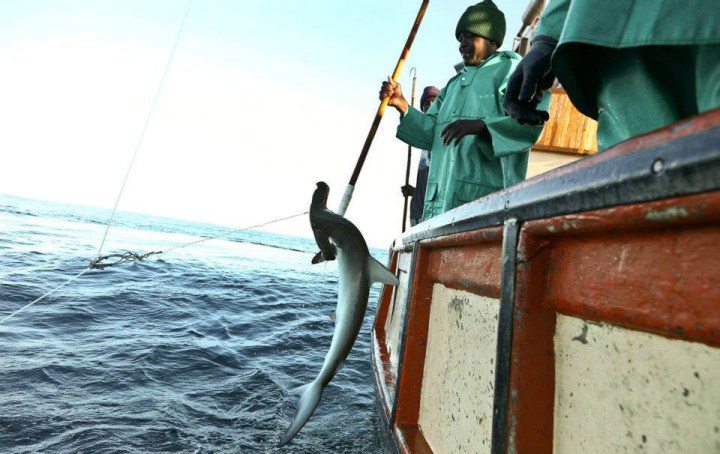
Great white sharks, those spooky, scary, fascinating monsters of the deep, have all but vanished from our coasts. Was it hungry orcas, greedy long-line fishers stealing their food or did they simply melt away into the endless ocean? Maybe it was about fish and chips.
An alien civilisation coming across our solar system would name our planet Ocean, for most of Earth is under water. Being air-breathing and living on the bits that stick out, we mostly regard the vast liquid blue that surrounds us as a beautiful but often scary “other”. Billions of us, however, rely on it for food. This is Part Two of a series about the relationship between the creatures below the sea’s surface and the people in boats who catch them. Read Part One
Through a friend in 2011, Oliver Godfrey met Gary McFarlane, the then Port Elizabeth-based skipper of a demersal shark long-line boat called White Rose. When one of the crew was fired, he was offered a job. As a young photographer interested in wildlife, the chance to do some trips with him was appealing, so Oliver joined up on nine week-long trips. The next two months of shark catching would traumatise him for the rest of his life.
“Gary called himself Shark Slayer and he was that for sure,” Oliver told me after years of remaining silent about his experience. “They were fishing between PE and De Hoop further west. Every trip – and I did nine or 10 – they were (tonnes) of sharks. Smooth-hounds, soupfin sharks, disallowed species such as ragged-tooth sharks, hundreds of spotted gully sharks and hammerheads, including hundreds of pregnant sharks.
“Three great whites got entangled in the long-lines and killed while I was on board. The guys were indiscriminate. Hundreds of seabirds were hooked and killed – gannets, cormorants, albatrosses. There was big bycatch that was discarded dead. They were fishing next to – and I’m sure in – Marine Protected Areas [MPAs].
“I hung on longer than I should have to document what was going on, but I can tell you I ended up so broken by the massive carnage, the cruelty. Traumatised, depressed.
“I needed help to get the story out, but nobody would help. I was advised to drop it. I had all these photographs. They knew that and I got frightened. Then I had three break-ins in two months. My hard drive with the pictures was stolen.
“For years now I just left the story lying there. But it needs to be told because the killing hasn’t stopped; the great whites are almost gone. And some of the images were saved to the cloud as proof of my story. So now I’m telling you.”
That was how this story began. Could Oliver’s story be corroborated? The ocean is large, the Department of Forestry, Fisheries and the Environment (DFFE) does not place observers on these boats; there are no snoopy members of the public out there in the empty sea; crews are dependent on skippers for jobs so won’t talk. You can pretty much do as you please … which is why information from an “insider” like Oliver is rare and valuable.
Great whites
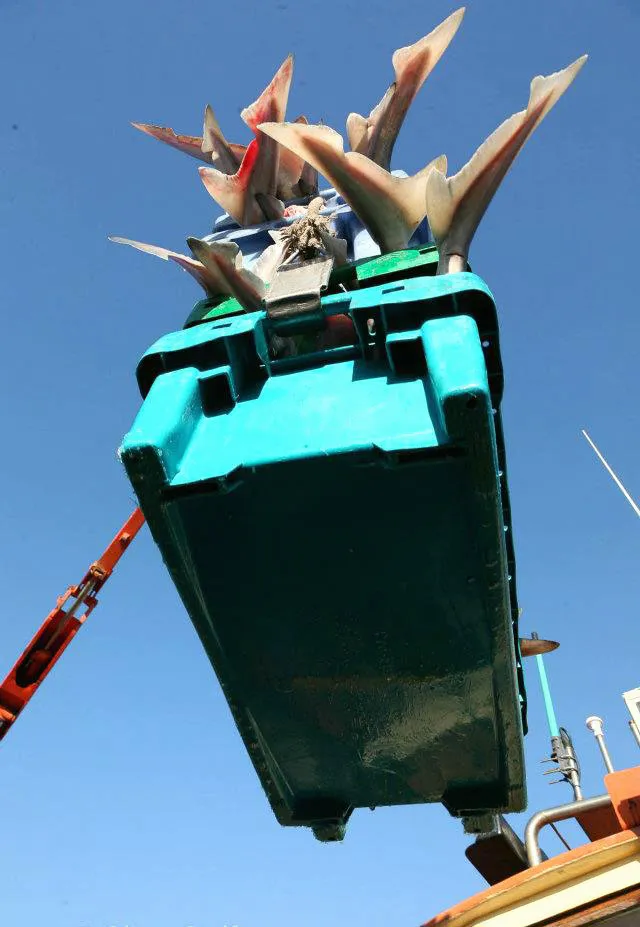
A load of sharks is moved ashore. (Photo: Oliver Godfrey)
There are around 535 species of sharks in the world, one in three listed as vulnerable, endangered or critically endangered. My checking began with the apex predator poster-fish: great whites.
Despite being protected in South Africa, they’re missing in action, collapsing a billion-rand cage-diving tourist industry. Why? Four reasons have been suggested by a range of sources:
- Orcas;
- A shift in distribution;
- They’ve been killed by the KwaZulu-Natal Sharks Board’s nets and baited drum lines; and
- The destruction of their food source (and themselves) by demersal long-line fishing boats.
Let’s begin with the orcas. When the shark cage-diving industry in Gansbaai crashed for want of viewing great whites in 2017–2018, two orcas, Port and Starboard, were blamed. Five white sharks, their livers bitten out in a way typical of orca predation, washed up in Gansbaai. Culprits found and convicted.
But then a study by University of Exeter scientist Robin Fisher noted that white sharks had started declining in Gansbaai in 2013, before the arrival of the two orcas, which had simply added to the problem. It was more likely, he said, that the orcas, which before had not predated on white sharks, were doing so because of the overfishing of pelagic fish stocks.
So orcas may have moved inshore where they started preying on white sharks. However, the decline of white sharks in False Bay, starting in the early 2010s, actually matches the increase in effort by demersal shark long-line boats. As smaller sharks are also the whites’ main prey, this and not orcas, said Fisher, was likely to have precipitated their population to crash.
A later study (discussed below) would confirm that whites began declining in Gansbaai and False Bay before the orcas arrived.
So could the problem be over-fishing? Sharks are caught in massive numbers worldwide – one study put the number at anything between 63 and 723 million hooked a year. A study by TRAFFIC on trade dynamics put South Africa’s export of shark meat between 2012 and 2022 at 14,000 tonnes.
Great whites, being apex predators, are relatively few in number – a study done by Alison Towner in 2013 estimated there were around 900 white sharks left in South Africa, while Dr Sara Andreotti of Stellenbosch University put that number in 2016 between 353 and 522. By fish standards that’s not many.
Main prey
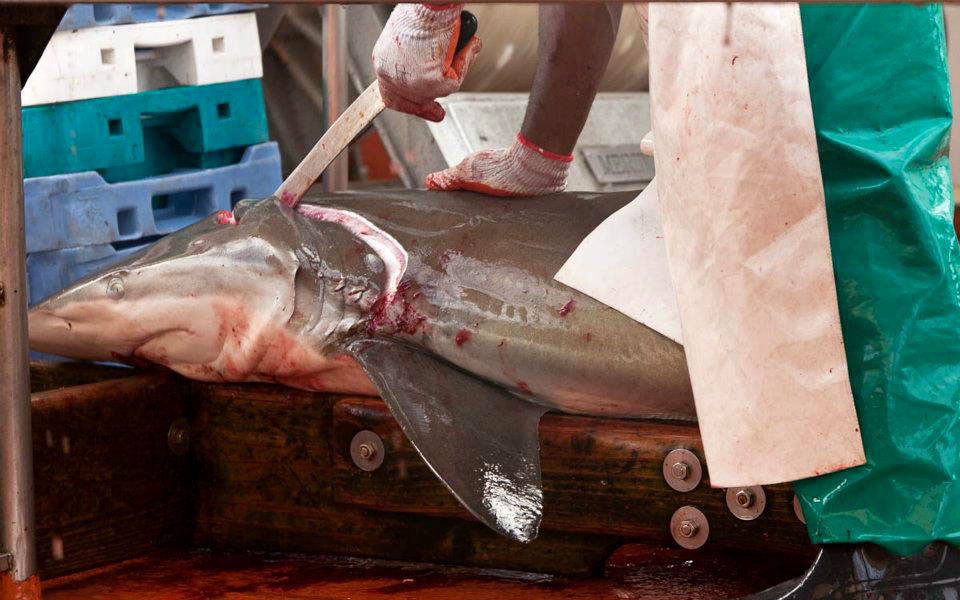
Gutting a bronze whaler, a food source for the great white. (Photo: Oliver Godfrey)
They’re very general hunters but have a selective preference for other sharks. A study of the stomach contents of 591 whites confirmed their main prey was smaller sharks such as bronze whalers, smooth-hounds and soupfin sharks, which were being targeted by long-line boats based in Gqeberha. They belong to three companies, Fisherman Fresh owned by Sharmilla van Heerden, Letap Fishing owned by Imraan Patel and Unathi Wena, whose MD is Tasneem Hajee. All are no strangers to controversy. Calls to all three were not returned and a list of questions to Van Heerden were not answered.
Unathi Wena and its boat White Rose are currently involved in a court case in Bredasdorp Magistrates’ Court charged with fishing in a MPA. In 2014 Fisherman Fresh, was charged with illegally exporting 95 tonnes of shark and octopus to Australia, the sharks to be used in sales of fish and chips. Van Heerden was eventually acquitted.
For many years members of the public have reported seeing the Gqeberha long-liners prowling around MPAs (and occasionally in them), pulling out thousands of sharks. Every now and then a reminder comes ashore. In 2018, shark heads began washing up on the beach at Kanon Rocks and the boats White Rose and Mary Ann appear to have been the source. In 2020 a pile of headless, gutted sharks past their sell date were found dumped on Strandfontein beach in False Bay.
In May 2019 the White Rose was caught allegedly fishing illegally in the De Hoop MPA. In the same month a second vessel, the tuna long-liner Prins Willem 1 was also arrested when it docked in Port Elizabeth. It had allegedly been illegally fishing in the Amathole MPA off East London. In both cases, a total security of R400,000 was paid and the catches were released.
According to Chris Fallows of Apex Shark Expeditions, who has worked with great whites in South Africa for more than 30 years, “in the late 1990s DFFE gave out demersal shark long-line permits and fishing for sharks in [False] Bay rapidly increased. By the mid to late 2000s we noticed a slow decline of white shark sightings at Seal Island, nothing drastic but an overall down trend.
“Suddenly, around 2010, three boats started fishing the resource hard. They learnt how, where and when to target the smooth-hound, soupfin, bronze-whalers and hammerhead sharks. Their technique was highly focused and localised to sites where these species gather. They deny catching hammerheads because they’re protected, but they do and we have evidence. Oliver got pictures.
“Their catches soared and our sightings of white shark in False Bay went through the floor. In a nutshell, there are no longer enough smooth-hounds and soupfins left in False Bay to sustain the white sharks for the eight months of the year they’re not at Seal Island.
“Add to this the octopus fishery – which started in earnest around the same time targeting the key food source of smaller sharks – and you have a double whammy.”
Department of Fisheries scientists knew these sharks were racing towards crisis point. They openly acknowledged that even if all fishing for these species stopped, the soupfin shark stock could not be sustainably fished even by 2070.
A report issued by Fisheries in 2021 said that “at current catch, the soupfin shark is likely to be commercially extinct in 20 years. Fishing pressure is also already too high on the smooth-hound shark. Given that a maximum of four vessels have been active and fishing at any point in time, the state of the soupfin and smooth-hound shark stock cannot sustain an increase in effort”.
The report added another concern: “There is a health concern related to sharks being consumed. Sharks over a certain size (12kg ~ 130cm total length) are not safe to consume due to high levels of accumulated methylmercury and arsenic (among others). For some species (predatory sharks like mako sharks and sevengills) it is likely that no sizes are safe to consume at all.”
While the department introduced slot limits (not to catch younger or more mature animals), their own research told them this alone would not be enough. For instance, in 2010 the department reported annual catches just by demersal long-liners of soupfin at 106 tonnes and smooth-hound at 110 tonnes.
To be sustainable, the maximum upper limit for smooth-hound sharks was calculated at 75 tonnes annually from 2016 onwards; yet in 2019, the minister reported in Parliament estimated catch levels between 2016 and 2019 at one-and-a-half to three times higher than that by demersal long-liners alone.
Limiting tonnage a no-go

The end of a hammerhead. (Photo: Oliver Godfrey)
Because limiting tonnage would make the industry less profitable, it hasn’t been implemented. According to DFFE scientists who spoke to me off the record, this is presently totally unsustainable. The 2023 Parliamentary debate on fisheries can be accessed here.
Here’s the thing: even though smooth-hound sharks are considered by the DFFE’s own stock assessment as endangered and soupfin as critically endangered, they are still kept on the target species list of the official permit for demersal shark long-liners with no maximum catch limit. However, growing concern may be reflected in that by October 2023 only one demersal shark long-line licence had been allocated.
Of course, those sharks are also caught as bycatch in other fisheries and by surf anglers and the final catch weight or composition is anybody’s guess.
But who’s watching? There are no fisheries observers on those shark boats, catches are only occasionally checked and the DFFE mostly relies on the commercial logbooks entered by the same boats to track catches.
According to Oliver, “when a catch was being offloaded at the port, there’s not a chance that every single specimen was inspected. It’s bullshit for DFFE to try to claim that. I don’t think the inspectors really knew what was on the catch list or off it. They just processed the paperwork, took the skipper’s word for it, and off the catch went to Australia.”
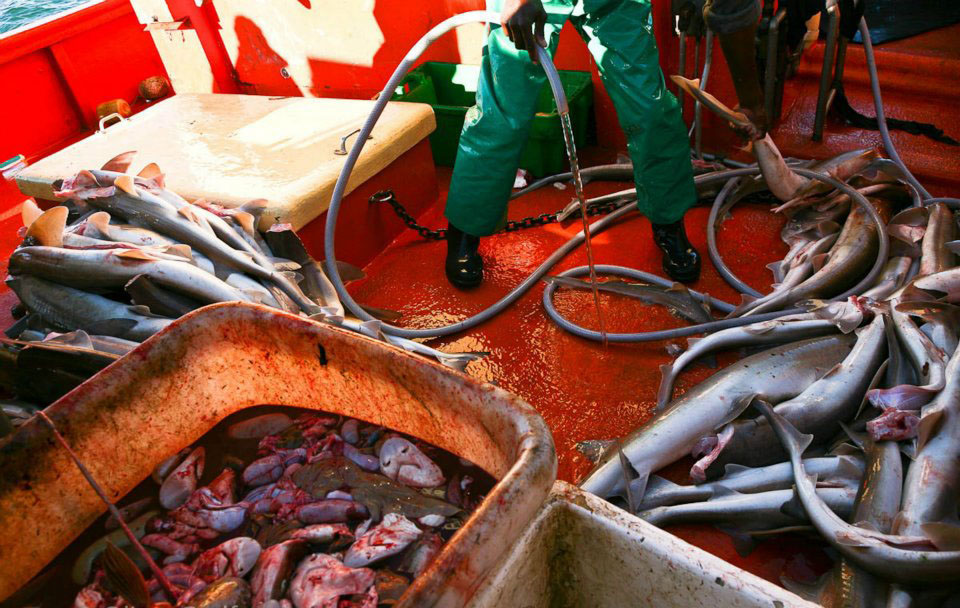
Photographer Oliver Godfrey, who has had firsthand experience aboard demersal long-line boats, says there is no way the DFFE inspects every specimen caught by the boats. (Photo: Oliver Godfrey)
Deadly nets
The great white problem may not be just about long-line fishing catching their prey. A parallel threat is along the beaches of KwaZulu-Natal – baited drum lines and shark nets, which do not only separate sharks from people, but are also devices aimed at killing sharks.
Despite being protected in South Africa, an average of around 28 white sharks have been killed by the Sharks Board alone every year since 1991.
According to Fallows: “On top of that source of mortality, when shark scientist Charlene da Silva of the Fisheries department did a test near Gqeberha with three demersal long-line sets they caught two great whites and killed one.”
“Let’s do the maths,” renowned shark biologist Enrico Gennari tells me, sitting on the edge of his chair in agitation. “By the DFFE’s own numbers, three whites caught over three days means that in nine weeks (the time Oliver was on the White Rose) shark long-liners would have caught and killed more white sharks than what Oliver reported. So Oliver’s numbers are realistic. If we extrapolate what he saw to the average demersal shark long-line fleet of the last 10 or so years, it would equate to an average of 50 to 60 white sharks killed every single year”.
“When you add this to what the KZN Sharks Board kills, you have nearly 100 whites a year being taken out of an estimated population of at most 1,000, or maybe even half of that.
“Great whites reproduce very slowly, only a few pups a year. At best, a 10% annual loss on a population of 1,000 is unsustainable. And that’s likely why we start to see a decline year on year since the early 2013, after the increase in effort by the demersal shark long-line fishery.
“Of course the orcas added to the problem,” says Fallows, “but elsewhere, when orcas kill white sharks, they move away but come back. They don’t disappear. Here they have. It’s because their population is crashing”
Maybe they migrated
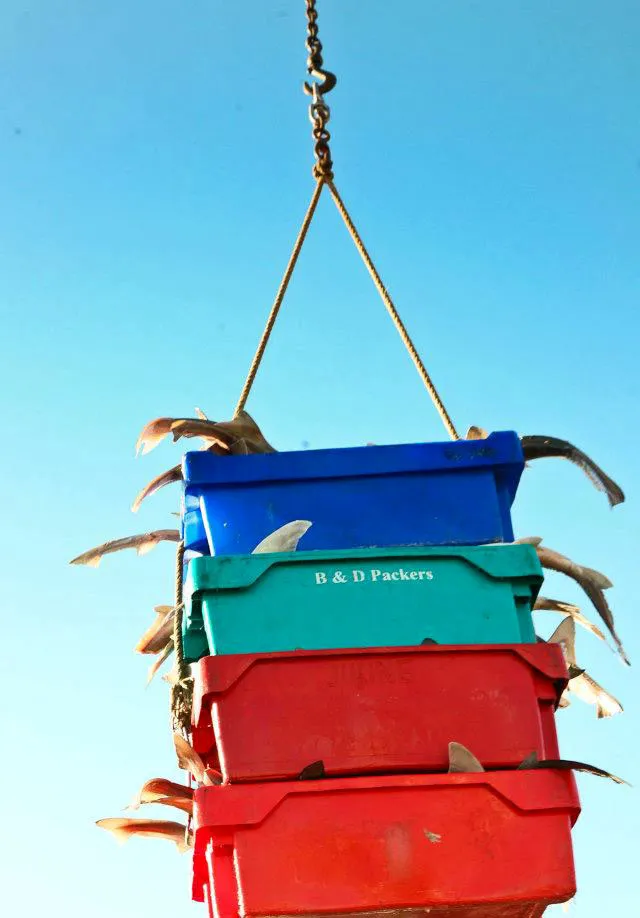
Sharks on the hoist. (Photo: Oliver Godfrey)
A 2023 research paper in Ecological Indicators led by Dr Matt Dickens of the KwaZulu-Natal Sharks Board and a group of other scientists favours the redistribution theory. The paper, using what Gennari describes as simplistic inferences, claims the orcas chased great whites up the coast, but that their population is “pretty stable”.
“Their population status appears largely unchanged,” they write, “despite the substantial reduction in occurrence in False Bay and Gansbaai in the last five years. For the status of white sharks in South Africa to remain unchanged, the population must have redistributed along the South African coastline.”
Gennari disagrees. “White sharks are down in False Bay, Gansbaai, Mossel Bay. Maybe there are three to 10 in Plettenberg Bay and a shark cage-diving operator in Gqeberha tells me he just saw his first white shark this year in August. If all the sharks migrated up the coast, you should have had a big uptick on the KZN drum lines, but you haven’t seen that.”
That paper’s message suggesting the white population is stable with no reason for concern and echoed by the media, says Gennari, “is very dangerous and could sink the conservation of white sharks in South Africa forever”.
What now?
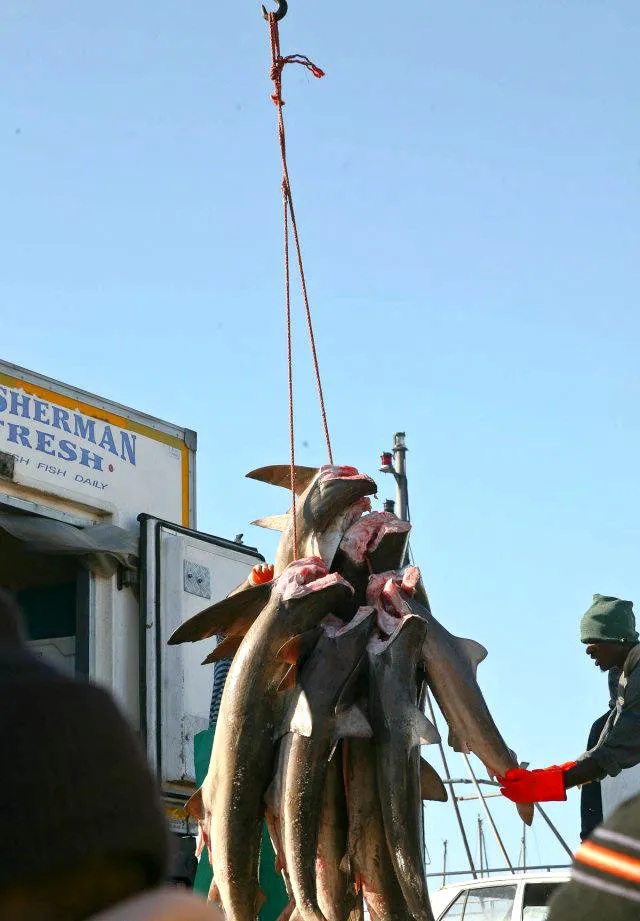
Weighing the catch at Fisherman Fresh. (Photo: Oliver Godfrey)
So where does that leave sharks in South Africa? The news is not good. “Fisheries are allowing the commercial fishing of endangered and critically endangered species,” says Fallows. “It’s unheard of. It’s like allowing gin trapping of wild dogs in the Kruger National Park.
“Our so-called ‘best managed fishery in the world’ – as DFFE claims – has ‘managed’ two species from vulnerable to endangered and from endangered to critically endangered. We’ve also lost our white sharks; we’ve lost our hammerheads.
“If this is the best fishery in the world, then the yardstick by which we measure these things is not merely low, it’s subterranean. That’s really where we are. It’s disheartening.”
Back to Oliver Godfrey, the traumatised photographer on the White Rose. It’s likely what he was witnessing in 2011 was the beginning of the end of great whites on South Africa’s southern shores through direct white shark mortality and the demolition of their food source by four long-liners. If his story had been heard earlier, something might, just might, have been done to stop the decline. But it wasn’t.
“I come from a diving background. I absolutely love the ocean,” he tells me. “What I saw was totally, totally ruthless. I felt it was my responsibility to record this experience. At the time I was handing out information to people, but they just didn’t give a shit.
“There was no limit on the numbers caught or species size. They didn’t take the hooks out of bycatch they didn’t want, they just bashed the fish on the side of the boat or simply cut their head off to not waste time taking out hooks. The damage caused by shark long-lining is insane. It is absolutely fucking insane.”
It is clear that urgent action is needed. This includes the permanent withdrawal of the demersal shark long-line fishing permits and a switch by the Sharks Board to more modern and sustainable ways to protect bathers in KZN.
Meanwhile, the shark cage-diving industry is in freefall with no end in sight and the little fishing communities that it supported are hurting.
It is not just about white sharks, says Fallows. “They’re a poster species for all others of the ocean. If we can’t protect such an important creature so vital to South Africa’s tourism, then the rest of our seas are in deep trouble.” DM







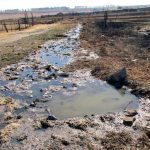











 Become an Insider
Become an Insider
I didn’t know that shark cage diving is no more…thanks DM! Now but an unticked box on my bucketlist. Neither did I know that poachers depleted our abelone stocks…till I read the book, Poacher, by Kimon de Greef and Shuhood Abader. From all corners, the message is clear: homo sapiens is doing what it’s been doing since time immemorial…either domesticating or killing animal protein sources. There’s nothing in between. The oceans survived longest but sadly, now their time has come too.
Too many people in the world and people who want to get rich quickly. What does Australia do with everything? The have their own oceans? Denise Smit
This is unacceptable – we need to get over ourselves. People complain about the source of their livelihoods becoming scarce – that is happening across ALL sectors that depend on wildlife and the environment. We have killed off much of this world and won’t stop until we live in barren wastelands, preying on each other… we need to abandon the idea that animals are a food source. It’s outdated and killing our world. If others have done it, we can as well 😒
This makes me sad. Really sad. What do we do to stop this issue? Why can’t the demersal long-line licences be withdrawn? Would it be against the interests of the vote-hungry ANC?
Because the Fisheries department is a totally useless body and waste of taxpayer’s money. Tons and tons and tons of abalone is poached from the West Coast every year. SAPS knows about it, Fisheries knows it, the City of Cape Town knows it and they do NOTHING!! The great JP Smith can’t even get his precious metro police to stop those vehicles.
There’s tons of proof. And they know about it!! But they do NOTHING!!
The root cause, which no one wants to address, is of course consumption of fish.
Completely agree with you; its been more than proven that human consumption of fish at a commercial scale is killing our oceans.
I would only agree partially with your point. I think the ultimate root cause is one of population dynamics. Eight billion human beings cannot sustainably coexist with the rest of life on earth, regardless of what we choose to eat. Mass extinctions and drastic reduction in biodiversity are impossible to prevent with the current global human population size.
This to me is the elephant in the room that humans cannot face. Sadly, even this figure of speech will soon become redundant as elephants themselves are being eradicated at a devastating rate – there were 10 million African elephants in 1913 and now 110 years later there are 415,000 left
There are too many of us now. What will this world look like by the end of the millennium when educated forecasts (UN figures) suggest that there will be 10.4 billion of us?
This rampant destruction of our country’s marine resources has been enabled by the DFFE. As the state authority entrusted with the sustainable management of our natural resources, they are not only failing in their duties (like every other government institution under the ANC) but they are complicit partners in the decimation of the livelihoods of communities who could be supported by properly and honestly administered resources. Their continued licensing of the demersal long-line fishing operations, in spite of the mountain of evidence of the harm they are causing, is a crime against our country, the natural environment and the economic well being of our people.
Yet another symptom of this shitty government’s rent-seeking, extractive
modus operandi.
Thank you for the article. Is there an attempt to change legislation to a complete ban on shark fishing? If so, how can we support it as citizens? If not, what actions appart from food choices can we take as citizens?
What an utterly depressing read. Is there no action that can be taken against the DFFE to force them to do something?
South Africa spent a fortune on sophisticated fishery protection vessels which when they were built by Farocean Marine performed superbly and we were always hearing of their success. On the occasions that I now go into CT harbour they are always tied up on the mole. What is going on, is there no money or is it something more sinister?
The sinister element is the ANC mafia!
There is the usual corrupt ANC government official behind all of this. They don’t give a damn about anything other than their materialistic wellbeing which is totally opposite to their communist policies! Simply scupper or impound the boats to start with.
We are destroying our childrens heritage
Much more pressure needs to be brought to bear on the authorities
These people have no faith, thinking that the corrupt officials are allowing them to get away with this; a day of recompense awaits them!
We are or own worst enemy.
Kill everything in sight including humans.